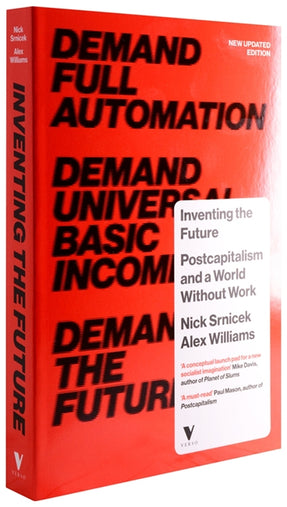Paperback
+ free ebook

+ free ebook
A major new manifesto for a high-tech future, free from work
Neoliberalism isn’t working. Austerity is forcing millions into poverty and many more into precarious work, while the left remains trapped in stagnant political practices that offer no respite.
Inventing the Future is a bold new manifesto for life after capitalism. Against the confused understanding of our high-tech world by both the right and the left, this book claims that the emancipatory and future-oriented possibilities of our society can be reclaimed. Instead of running from a complex future, Nick Srnicek and Alex Williams demand a postcapitalist economy capable of advancing standards, liberating humanity from work and developing technologies that expand our freedoms.
This new edition includes a new chapter where they respond to their various critics.
A powerful book: it not only shows us how the postcapitalist world of rapidly improving technology could make us free, but it also shows us how we can organise to get there. This is a must-read.
Inventing the Future is exactly what we need right now. With immense patience and care, it sets out a clear and compelling vision of a postcapitalist society. Equally importantly, it lays out a plausible programme which can take us from 24/7 capitalist immiseration to a world free of work.
Neoliberalism and austerity seem to reign supreme – the idea of a society not run for profit seems impossible. Or does it? The fascinating Inventing the Future: Postcapitalism and a World Without Work by Nick Srnicek and Alex Williams argues for a radical transformation of society.
Inventing the Future is unapologetically a manifesto, and a much-overdue clarion call to a seriously disorganized metropolitan left to get its shit together, to start thinking — and arguing — seriously about what is to be done…It is hard to deny the persuasiveness with which the book puts forward the positive contents of a new and vigorous populism; in demanding full automation and universal basic income from the world system, they also demand the return of utopian thinking and serious organization from the left.
Srnicek and Williams demonstrate how a sustainable economic future is less a question of means than of imagination. The postcapitalist world they envision is utterly attainable, if we can remember that we have been inventing the economy all along.
Nick Srnicek and Alex Williams' project dares to propose a different way of thinking and acting. Given the fizzling of the Occupy moment, a radical rethinking of the anarchic approach is badly needed but just not happening. This book could do a lot of work in getting that rethink going.
A conceptual launch pad for a new socialist imagination…
The most important book of 2015.
They argue that, in the future, the workplace won't exist in anything like the form we have now, and in any case it will have very few permanent workers. Assuming this position, they ask: What would be the social vision appropriate to a jobless future?
Inventing the Future may be the shrewdest, sanest pipe dream of a book published since the recession.